United Arab Emirates -

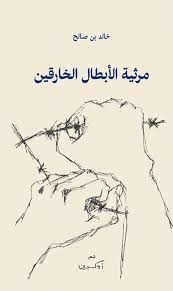

On a small rooftop in one of the neighborhoods of Homs, the Hamimati Nabih Wardan and his birds live a life parallel to what is happening around him in the city, a private, exotic, warm, and pure life, different from the harshness of the chaos, destruction, and displacement events that Homs is experiencing during March 2011. There is a curfew on the entire city, and the birds remain, for a while, enjoying the freedom to fly in a vast sky that knows no restrictions, but even this matter is about to change as soon as the hand of the “khaki-clad ones” extends its hand to the sky as well as to the earth, thus closing Nabih’s crossing to life. Another. In the novel “The Unfamiliar Passage,” Firas Al-Maasarani explores - in a simple and direct manner - the magical world of Al-Hamimatiya, with its rituals and seductions related to everything related to birds and their breeding, but he goes further than that to take a look at the city of Homs as a whole, and its daily routine before it was swallowed up by the moment of transformation. .

There are no names for the women in this book. Rather, they are just bodies. It is through the body that society recognizes them, and through it they also identify themselves. This often alienated body is the same body that deserves to be celebrated and celebrated. By masterfully combining, with innovative writing techniques, the real and the imagined, and carelessly collapsing the boundaries between psychological realism, science fiction, comedy, horror, fantasy, and magical realism, Carmen María Machado pours out in Her Body and Other Parties her vision of the contradictory world of real women. : The beautiful, the funny, the strange, the dark, and the terrifying, alike. This contradiction is etched in their experiences and daily lives, between push and pull, independence and helplessness, to ultimately reveal the surreal meaning of being a “woman.”
By Eduardo Galeano Translated by: Saleh Secular
/ القدم بين الشمس والظل (طبعة مزيدة)-1717684148.jpg)
Eduardo Galeano is a genius writer and a lousy football player, but his lack of skill in playing football did not make him lose his passion for this sport, for which he harnessed his abilities as a storyteller, historian, and loyal fan. The book “Football Between Sun and Shadow” is an attempt to “atone for sin,” in which Galeano provides a brief account of the history of football, and the changes that have occurred to the game over time, especially in light of the fundamental importance that the game has acquired in Latin American countries. He also recalls luminous joints. Unforgettable moments on the field, and exceptional players touched by the temptation of running after the ball. But Galeano, in his book, does not stop at the moments of excitement, glory, and fame only within the confines of the stadium, but rather goes digging into the shadows. To expose the myths that fans and players of this sport believed in, and the racism that followed them, and to also expose the amount of exploitation and corruption that turned this sport into a business, and its players into commodities, thus killing its enjoyment.
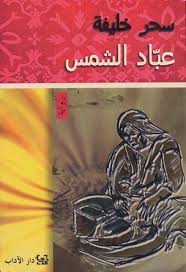
Delicacy did not protect the noble young woman in her twenties, Evelyn, from the disappointments of love, so she leaves Budapest, going to her ancestral home in a village on the banks of the Tisza River, in the hope that she will find tranquility and enjoyment there. But her sense of security is shaken as her suspicions mount that there is someone roaming around her house. Do you see him as her lover Kalman? She doesn't know whether to hope so or fear it! Evelyn immerses herself in a strange world in which the dead mix with the living, and reality with myth, so that everything strange seems very ordinary. A girl loves a tree, a man lies in his coffin and reads the book of prayers, and the ghosts of disappointed lovers haunt their lovers... In "Sunflowers", the Hungarian writer Jula Krodi uses descriptive language and free association in which dream and reality are mixed, to bring the reader into the depths of his characters and make him see nature through their eyes, drawing a picture of the Hungarian countryside in which people spend their lives searching for love, just as the sunflower moves. In search of light.
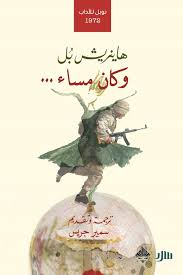
What is the true value of a soldier's foot that saved the life of a higher-ranking officer? How does a person who has made laughter his profession actually laugh? How do brief yes or no answers summarize a man's happiness? What memories will a few paintings hanging in a school turned into a military hospital evoke for an injured student returning from war? Is it better to live to work, or to work to live? These and other questions will be addressed by the German writer Heinrich Boll in this book. Reflecting in his sometimes funny, sometimes angry, and sensitive style every other time, his mockery of the conditions that followed the war, which forced people to resume their lives as if nothing had happened, and his mockery of the capitalist tendency that demands everyone to work to the best of their ability for the sake of “the future”... valuing contemplation. Slowly, Heinrich Bull writes in these stories his response to a hasty world, possessed by madness, and lacking its humanity.

Qasim, a lost young man, is forced to assume identities he did not choose, and always pays the price for mistakes he did not commit. But he finds an escape from his life and circumstances when the doctor, Ramzi Al-Nawawi, suggests that he travel with him to the country of the leader, “Big Boss,” to perform a mummification operation on the leader’s young daughter, who died under mysterious circumstances. Their arrival is accompanied by a mysterious epidemic spreading in the country that only attacks girls. Ramzi finds his opportunity to propose a project to “decorate” the deceased women, and he is soon faced with accusations and accusations. However, Qasim, who is drawn after the doctor like a bewitched person, and under his illusion, is unable to confirm the truth of what is being said, nor to deny it. Does the doctor really have anything to do with the epidemic? This time, breaking into a new world, Maryse Conde leads us from one mystery to another, in a breathless plot that strangely combines issues of identity, race, and religion, to tell us about the “flowers of darkness,” whom Ramsay believes are the only ones worthy of desire.
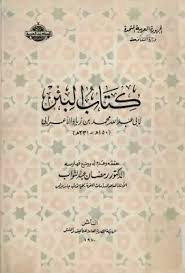
A journalist residing in Buenos Aires turns forty and decides to write his first book, but what will he really write about? About sad poets? Ex-girlfriends? Boats? The man struggles to find a starting point. He writes notes about events that happened, moving between memories, dreams, and dialogues, but he feels that the life he lived was richer and more intense than everything he wrote. Was it really richer? In the novel “The Well,” Juan Carlos Onte writes, through a flowing text that breaks down the barriers between times and places, feeling and subconsciousness, about a hero with a strange nature, marginalized, angry for no apparent reason, and always in some kind of misunderstanding that makes him unable to communicate. with the others. At the end of the novel, Onetti leaves us with a shocking feeling, as we wonder about the nature of the work we read: Was it a novel, a dream, or do you see it as mere delirium?

A mysterious, sick man in his forties arrives in a remote town, but he refuses to stay in the asylum to receive treatment, choosing instead to stay in a hotel and rent an abandoned house in the town, where he goes up from time to time. The man's life is almost devoid of events except for receiving regular letters from two different "women" who visit him later and stimulate the curiosity of the townspeople to make judgments and draw different plots for the relationship that the man may have with them. Like Juan Carlos Onte's other books, this novel surprises the reader with the fact that each sentence is formulated in a unique way and ends unexpectedly, as if it were carefully woven to amaze him and provoke him to contemplate how its author squeezed the energy of each word to convey the greatest amount of feelings.
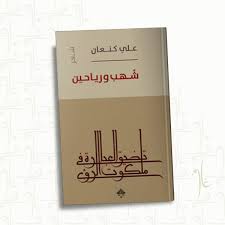
Alone on Baraway Island, Ingrid lives after everyone has left, roaming the ruins, repairing what can be repaired, and catching fish and bodies that wash up on the island's shores. The young woman struggles to hide a big secret that could put her in danger, as the country witnesses the final months of World War II. In this novel, Roy Jacobsen completes the story of Barawe Island, which began with "The Invisibles", with his delicate narration, natural images, and brief sentences that hide the truest and hottest feelings behind them. “White Sea” is a novel about new beginnings that make their way from the ashes of a devastating war, about friendships and love, the faces of those passing by and the dead, and about people who remain where they are in the face of war, bidding farewell to the departed and receiving those returning, and monitoring the passing of days and the succession of seasons.
By Neil deGrasse Tyson / Translated by: Razan Youssef Salman
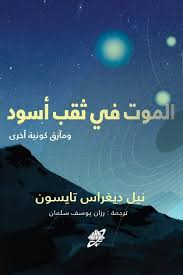
I do not see the universe as a collection of objects, theories, and phenomena. Rather, I see it as a vast stage on which actors move, driven by the complexities of the story and its plot. So when writing about the universe, it is natural to bring readers to the stage, and behind the scenes, to see firsthand for themselves how the scenes are prepared, how the lines are written, and where the events will take place later. My goal has always been to provide insight into how the universe works, which is more difficult than simply conveying facts. We will encounter times along the way - as in the best theatrical performances - when we smile, and at other times we frown when the universe calls us to do so, and at other times we will tremble in fear before it as well. Therefore, I see the book “Death in a Black Hole” as a gateway for the reader to everything that excites us, enlightens us, and terrifies us in this universe. Neil deGrasse Tyson
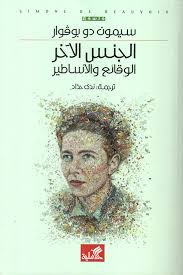
How could she find boldness, ardor, detachment, and greatness in her? These qualities only appear when a freedom throws itself into an open future, emerging beyond every given thing. We lock a woman in a kitchen or a bedroom, and we are surprised that her horizon is limited. We cut its wings, and we are sorry that it does not know how to fly. Let us open up the future to her, and she will no longer have to stay in the present. We show the same contradiction when we imprison her within the confines of her ego, or her home, and blame her for her narcissism, her selfishness, and what accompanies them: such as vanity, crankiness, evil...etc. We strip her of all possibility of tangible communication with others, so that in her experience she does not feel the call of solidarity, nor its benefits, since she is completely devoted to her family, and isolated; Thus, we cannot expect it to transcend itself towards the common good. She stubbornly stays in the only field she is familiar with; Where you can exert influence over things, and within it you find fleeting sovereignty.
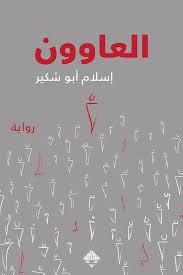
The little boy escapes from the midwife's hands, and all attempts to catch him fail, until Abu Muharib, a retired policeman who suffers from rheumatism, intervenes, using his old hunting experience. The chapters of the story continue, until the moment in which the reader finds himself facing a world in which reality is mixed with its strict natural laws, and imagination soaring on the same wings that changed the course of (the little one’s) life with her presence first, and her absence next.. What wings are these where scissors, scalpels, knives and guns lurk? Who are those howling in the background? What fate did those living below end up with? The novel raises many questions, then stops at this point, shirking the burden of definitive answers, and assuming that the reader will not be let down by the wings of his imagination in reaching an answer.
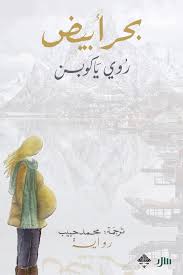
Alone on Baraway Island, Ingrid lives after everyone has left, roaming the ruins, repairing what can be repaired, and catching fish and bodies that wash up on the island's shores. The young woman struggles to hide a big secret that could put her in danger, as the country witnesses the final months of World War II. In this novel, Roy Jacobsen completes the story of Barawe Island, which began with "The Invisibles", with his delicate narration, natural images, and brief sentences that hide the truest and hottest feelings behind them. “White Sea” is a novel about new beginnings that make their way from the ashes of a devastating war, about friendships and love, the faces of those passing by and the dead, and about people who remain where they are in the face of war, bidding farewell to the departed and receiving those returning, and monitoring the passing of days and the succession of seasons.
By Anna Maria Matute / Translated by: Ali Ibrahim Ashkar

After his return to the island, Manuel decides to dig into the past to recover the details of the murder of the man he adopted. He also tries to get to know more about the wife of Khatha, the mysterious man whom he had only met briefly, but who left a great impression on him. “Khitha,” the absent man, is the most present in the novel, and his presence will change the fate of the lives of its characters, including his wife, who irrevocably left her previous life and went on to rediscover herself after her meeting with him. In the novel “Soldiers Cry at Night,” Anna Maria Matute attempts to experiment with new narrative methods based on mixing the narrators’ voices so that the speech of all the characters seems, in one way or another, to be one continuous dialogue. The dense, highly sensitive and delicate spectrum of characters in this novel will continue to haunt the reader and motivate him to re-read the book, which ended prematurely, leaving many outstanding questions.

Enter your address and we will specify the offer for your area.